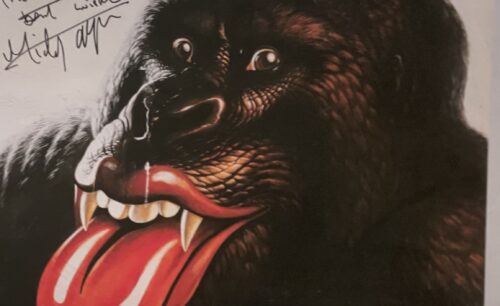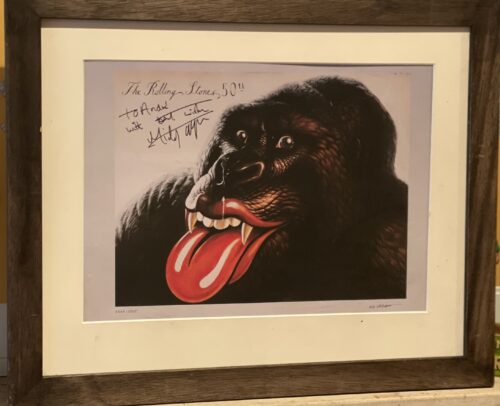-

 26cm diametre Nazi dictator Adolf Hitler loved Irish folk music, and historical photographs reveal that famous Irish musician Sean Dempsey played for him in 1936. Dempsey, an uileann piper, was invited to play for Hitler and propaganda chief Joseph Goebbels during a visit to Berlin in 1936 after being told that Hitler was an Irish folk music fan. When he arrived to play, however, there was no room for him to sit, which he needed to do to play, and it looked like it would be canceled. However, Hitler jumped up and demanded that an S.S. member get down on his hands and knees and that Dempsey sit astride him while he played. Dempsey played what was described as a "haunting air" as Hitler listened with rapt attention. After he performed, Hitler presented him with a gold fountain pen while Goebbels clapped wildly. The bizarre scene was revealed for the first time in a 2010 exhibition of Irish photographs from that era called "Ceol na Cathra." The exhibition opened in Dublin and was collected by legendary fiddle player Mick O’Connor. Also in the exhibit were rare photographs from the early days of The Chieftains and Sean O'Riada, the father of modern Irish folk music.
26cm diametre Nazi dictator Adolf Hitler loved Irish folk music, and historical photographs reveal that famous Irish musician Sean Dempsey played for him in 1936. Dempsey, an uileann piper, was invited to play for Hitler and propaganda chief Joseph Goebbels during a visit to Berlin in 1936 after being told that Hitler was an Irish folk music fan. When he arrived to play, however, there was no room for him to sit, which he needed to do to play, and it looked like it would be canceled. However, Hitler jumped up and demanded that an S.S. member get down on his hands and knees and that Dempsey sit astride him while he played. Dempsey played what was described as a "haunting air" as Hitler listened with rapt attention. After he performed, Hitler presented him with a gold fountain pen while Goebbels clapped wildly. The bizarre scene was revealed for the first time in a 2010 exhibition of Irish photographs from that era called "Ceol na Cathra." The exhibition opened in Dublin and was collected by legendary fiddle player Mick O’Connor. Also in the exhibit were rare photographs from the early days of The Chieftains and Sean O'Riada, the father of modern Irish folk music. -
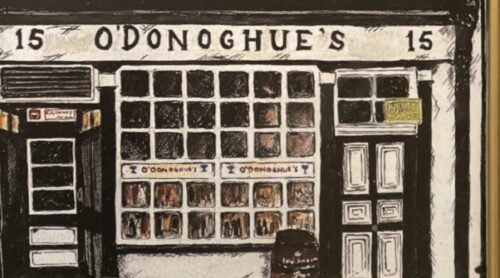
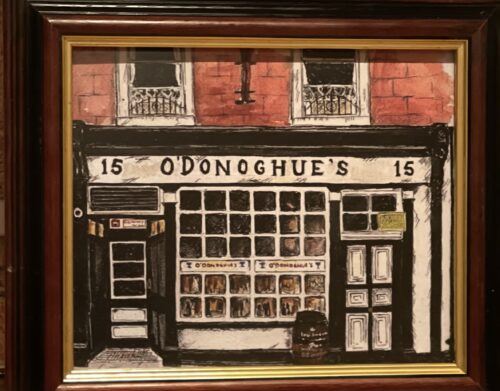 46cm x 33cm
46cm x 33cmHistory
This pub is closely associated with Irish traditional music and was where the popular Irish folk group, The Dubliners, began performing in the early 1960s. Many other notable Irish musicians—including Séamus Ennis, Joe Heaney, Andy Irvine,Christy Moore, The Fureys and Phil Lynott—have played at O’Donoghue’s, and their photographs are displayed in the pub. Included are portraits of The Dubliners themselves: the five founding members Ronnie Drew, Luke Kelly, Ciarán Bourke, John Sheahan and Barney McKenna, as well as later members Eamonn Campbell and Seán Cannon; these photographs hang to the right of the entrance, where the nightly sessions are played.Andy Irvine wrote the tribute song "O'Donoghue's", in which he reminisces about his early days in Dublin—when he first started frequenting the pub in August 1962. The song was released on the album Changing Trains (2007). Dessie Hynes from Longford bought the bar from Paddy and Maureen O'Donoghue in 1977 and ran the pub with his family for 11 years. In 1988, O’Donoghue’s was purchased by publicans Oliver Barden and John Mahon. Barden is still the proprietor and continues to run the pub with his family and staff to this dayO’Donoghue’s
~ Andy Irvine, 2004It was August 1962 When I first set foot in O’Donoghue’s A world of music, friends and booze Opened up before me I never could’ve guessed as I walked through the door Just what the future had in store A crossroads for my life I saw Lying there to taunt me. -
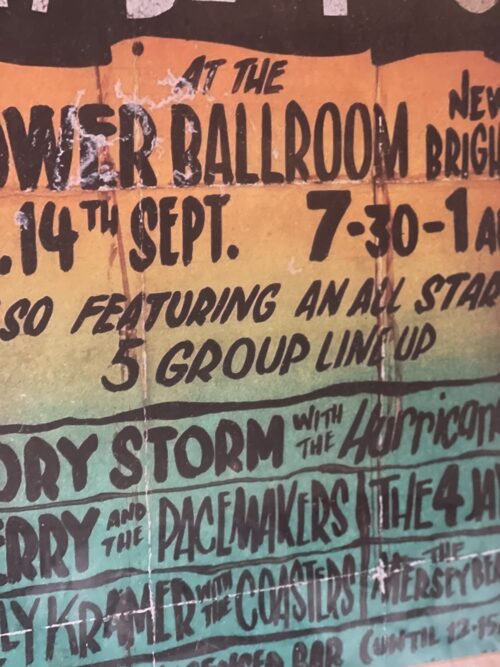
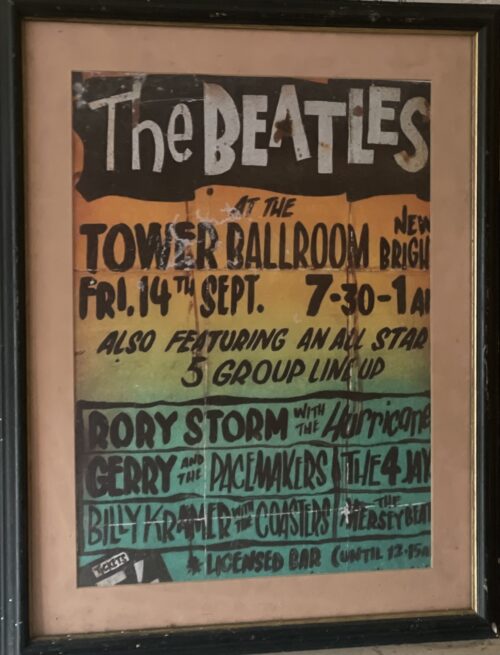 63cm x 52cm The greatest band in the world came from Liverpool, a city with an Irish population so large that it’s known as “The Real Capital of Ireland”, but although The Beatles’ success is familiar to all, their Irish roots are not so well-known. “We’re all Irish” John Lennon declared when the band toured Ireland in 1963. The singer was born in war-time Liverpool on October 9, 1940 to Julia and Alfred Lennon. His father, a merchant seaman of Irish descent, was away at the time of John’s birth and for much of his life.John knew little about his connection to Ireland whilst growing up, but it was in the post-Beatles days that he became one of the most famous voices calling for a United Ireland and for an end to English presence in Northern Ireland.Known for their political activism, John and Yoko penned two protest songs “Sunday Bloody Sunday” and “The Luck of the Irish” inspired by the events in Northern Ireland for their 1972 album Some Time in New York City Such was the connection Lennon felt to his homeland that he had hoped to make a piece of it a place for him and Yoko Ono to retire. He purchased an island off the West Coast of Ireland, which he owned until his untimely death in 1980.
63cm x 52cm The greatest band in the world came from Liverpool, a city with an Irish population so large that it’s known as “The Real Capital of Ireland”, but although The Beatles’ success is familiar to all, their Irish roots are not so well-known. “We’re all Irish” John Lennon declared when the band toured Ireland in 1963. The singer was born in war-time Liverpool on October 9, 1940 to Julia and Alfred Lennon. His father, a merchant seaman of Irish descent, was away at the time of John’s birth and for much of his life.John knew little about his connection to Ireland whilst growing up, but it was in the post-Beatles days that he became one of the most famous voices calling for a United Ireland and for an end to English presence in Northern Ireland.Known for their political activism, John and Yoko penned two protest songs “Sunday Bloody Sunday” and “The Luck of the Irish” inspired by the events in Northern Ireland for their 1972 album Some Time in New York City Such was the connection Lennon felt to his homeland that he had hoped to make a piece of it a place for him and Yoko Ono to retire. He purchased an island off the West Coast of Ireland, which he owned until his untimely death in 1980.“I'm a quarter Irish or half Irish or something, and long, long before the trouble started, I told Yoko that's where we're going to retire, and I took her to Ireland. We went around Ireland a bit and we stayed in Ireland and we had a sort of second honeymoon there. So, I was completely involved in Ireland” – John Lennon, 1971.
James Paul McCartney was born on June 18, 1942 in Liverpool to Jim and Mary Patricia (Mahon) McCartney, and like many other Liverpool families descended from Irish immigrants. His mother’s father was born in Ireland, and was Roman Catholic, while his great-grandfather was an Irish native, and Protestant.It is unknown which part of Ireland Paul McCartney’s paternal side is from, but it is known that they first emigrated from Ireland to Galloway, Scotland, and then on to Liverpool. McCartney, who immortalised the Mull of Kintyre with his song of the same name also wrote about his Irish heritage in his music. Like John and Yoko, Paul and his first wife Linda wrote in response to the events of Bloody Sunday, drawing from his Irish background in their controversial song “Give Ireland Back to the Irish”. The song was completely banned in Britain but reached number one on the singles chart in Ireland.Then there’s Ringo, and while Ringo Starr is often described as the most English Beatle, Mark Lewisohn in his book Tune In describes one family line going back to County Mayo suggesting that all four of The Beatles can be accurately described as having ancestral roots in Ireland.It was however George Harrison who had the strongest Irish connections, coming from an Irish Catholic family on his mother’s side. Unusually for the time his grandparents never married and Mark Lewisohn suggests that the secretive aspect to his family life and their suspicion of “nosy neighbours” had a lasting effect on the attitude of ‘the quiet Beatle’. Harrison would return to Ireland throughout his life to visit family living in North Dublin, often catching the ferry across from Liverpool to Dublin. He also took his soon-to-be-wife Pattie Boyd on an early vacation to Ireland. Harrison’s music however didn't overtly draw from his Irish heritage, but the films produced through his own company are peppered with references to Ireland.The “Scouse” accent of Liverpool itself betrays Irish influence, the port city became a melting pot of several languages and dialects, as sailors, traders and migrants from other parts of Britain, Ireland and northern Europe established themselves in the area throughout the 19th century. The Irish have played a major role in Liverpool's population and social fabric for a good part of its 800 year history and it is apparent today when visiting the city. It’s safe to say that the people of Liverpool are extremely proud of its four sons and the way that Irish influence has helped to shape this famous musical city. -
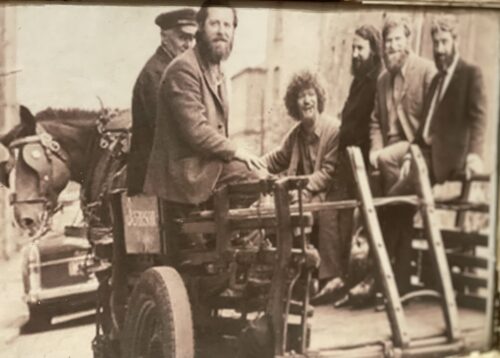
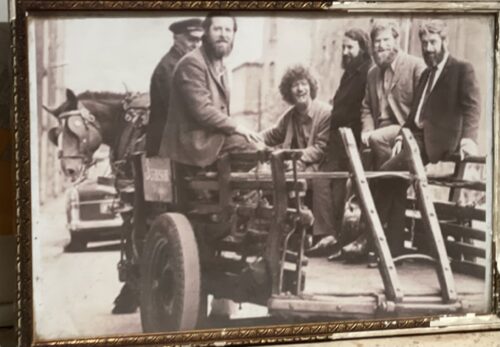 50cm x 60cm The Dubliners were quite simply one of the most famous Irish folk bands of all time.Founded in 1962,they enjoyed a 50 year career with the success of the band centred on their two lead singers,Luke Kelly and Ronnie Drew.They garnered massive international acclaim with their lively Irish folk songs,traditional street ballads and instrumentals eventually crossing over to mainstream culture by appearing on Top of the Pops in 1967 with "Seven Drunken Nights" which sold over 250000 singles in the UK alone.Later a number of collaborations with the Pogues saw them enter the UK singles charts again on another 2 occasions.Instrumental in popularising Irish folk music abroad ,they influenced many generations of Irish bands and covers of Irish ballads such as Raglan Road and the Auld Triangle by Luke Kelly and Ronnie Drew tend to be regarded as definitive versions.They also enjoyed a hard drinking and partying image as can be seen by many collaborations with alcohol advertising campaigns etc
50cm x 60cm The Dubliners were quite simply one of the most famous Irish folk bands of all time.Founded in 1962,they enjoyed a 50 year career with the success of the band centred on their two lead singers,Luke Kelly and Ronnie Drew.They garnered massive international acclaim with their lively Irish folk songs,traditional street ballads and instrumentals eventually crossing over to mainstream culture by appearing on Top of the Pops in 1967 with "Seven Drunken Nights" which sold over 250000 singles in the UK alone.Later a number of collaborations with the Pogues saw them enter the UK singles charts again on another 2 occasions.Instrumental in popularising Irish folk music abroad ,they influenced many generations of Irish bands and covers of Irish ballads such as Raglan Road and the Auld Triangle by Luke Kelly and Ronnie Drew tend to be regarded as definitive versions.They also enjoyed a hard drinking and partying image as can be seen by many collaborations with alcohol advertising campaigns etc -

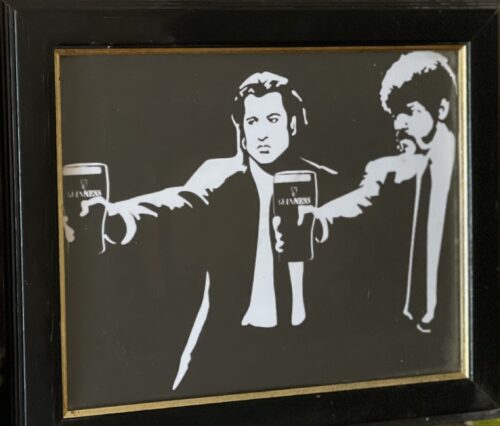 55cm x 45cm Luke Kelly (17 November 1940 – 30 January 1984) was an Irish singer, folk musician and actor from Dublin, Ireland. Born into a working-class household in Dublin city, Kelly moved to England in his late teens and by his early 20s had become involved in a folk music revival. Returning to Dublin in the 1960s, he is noted as a founding member of the band The Dubliners in 1962. Becoming known for his distinctive singing style, and sometimes political messages, the Irish Postand other commentators have regarded Kelly as one of Ireland's greatest folk singers. Early life Luke Kelly was born into a working-class family in Lattimore Cottages at 1 Sheriff Street.His maternal grandmother, who was a MacDonald from Scotland, lived with the family until her death in 1953. His father who was Irish- also named Luke- was shot and severely wounded as a child by British soldiers from the King's Own Scottish Borderers during the 1914 Bachelor's Walk massacre.His father worked all his life in Jacob's biscuit factory and enjoyed playing football. The elder Luke was a keen singer: Luke junior's brother Paddy later recalled that "he had this talent... to sing negro spirituals by people like Paul Robeson, we used to sit around and join in — that was our entertainment". After Dublin Corporation demolished Lattimore Cottages in 1942, the Kellys became the first family to move into the St. Laurence O’Toole flats, where Luke spent the bulk of his childhood, although the family were forced to move by a fire in 1953 and settled in the Whitehall area. Both Luke and Paddy played club Gaelic football and soccer as children. Kelly left school at thirteen and after a number of years of odd-jobbing, he went to England in 1958.[6] Working at steel fixing with his brother Paddy on a building site in Wolverhampton, he was apparently sacked after asking for higher pay. He worked a number of odd jobs, including a period as a vacuum cleaner salesman.Describing himself as a beatnik, he travelled Northern England in search of work, summarising his life in this period as "cleaning lavatories, cleaning windows, cleaning railways, but very rarely cleaning my face".
55cm x 45cm Luke Kelly (17 November 1940 – 30 January 1984) was an Irish singer, folk musician and actor from Dublin, Ireland. Born into a working-class household in Dublin city, Kelly moved to England in his late teens and by his early 20s had become involved in a folk music revival. Returning to Dublin in the 1960s, he is noted as a founding member of the band The Dubliners in 1962. Becoming known for his distinctive singing style, and sometimes political messages, the Irish Postand other commentators have regarded Kelly as one of Ireland's greatest folk singers. Early life Luke Kelly was born into a working-class family in Lattimore Cottages at 1 Sheriff Street.His maternal grandmother, who was a MacDonald from Scotland, lived with the family until her death in 1953. His father who was Irish- also named Luke- was shot and severely wounded as a child by British soldiers from the King's Own Scottish Borderers during the 1914 Bachelor's Walk massacre.His father worked all his life in Jacob's biscuit factory and enjoyed playing football. The elder Luke was a keen singer: Luke junior's brother Paddy later recalled that "he had this talent... to sing negro spirituals by people like Paul Robeson, we used to sit around and join in — that was our entertainment". After Dublin Corporation demolished Lattimore Cottages in 1942, the Kellys became the first family to move into the St. Laurence O’Toole flats, where Luke spent the bulk of his childhood, although the family were forced to move by a fire in 1953 and settled in the Whitehall area. Both Luke and Paddy played club Gaelic football and soccer as children. Kelly left school at thirteen and after a number of years of odd-jobbing, he went to England in 1958.[6] Working at steel fixing with his brother Paddy on a building site in Wolverhampton, he was apparently sacked after asking for higher pay. He worked a number of odd jobs, including a period as a vacuum cleaner salesman.Describing himself as a beatnik, he travelled Northern England in search of work, summarising his life in this period as "cleaning lavatories, cleaning windows, cleaning railways, but very rarely cleaning my face".Musical beginnings
Kelly had been interested in music during his teenage years: he regularly attended céilithe with his sister Mona and listened to American vocalists including: Fats Domino, Al Jolson, Frank Sinatra and Perry Como. He also had an interest in theatre and musicals, being involved with the staging of plays by Dublin's Marian Arts Society. The first folk club he came across was in the Bridge Hotel, Newcastle upon Tyne in early 1960.Having already acquired the use of a banjo, he started memorising songs. In Leeds he brought his banjo to sessions in McReady's pub. The folk revival was under way in England: at the centre of it was Ewan MacColl who scripted a radio programme called Ballads and Blues. A revival in the skiffle genre also injected a certain energy into folk singing at the time. Kelly started busking. On a trip home he went to a fleadh cheoil in Milltown Malbay on the advice of Johnny Moynihan. He listened to recordings of Woody Guthrie and Pete Seeger. He also developed his political convictions which, as Ronnie Drew pointed out after his death, he stuck to throughout his life. As Drew also pointed out, he "learned to sing with perfect diction". Kelly befriended Sean Mulready in Birmingham and lived in his home for a period.Mulready was a teacher who was forced from his job in Dublin because of his communist beliefs. Mulready had strong music links; a sister, Kathleen Moynihan was a founder member of Comhaltas Ceoltóirí Éireann, and he was related by marriage to Festy Conlon, the County Galway whistle player. Mulready's brother-in-law, Ned Stapleton, taught Kelly "The Rocky Road to Dublin".During this period he studied literature and politics under the tutelage of Mulready, his wife Mollie, and Marxist classicist George Derwent Thomson: Kelly later stated that his interest in music grew parallel to his interest in politics. Kelly bought his first banjo, which had five strings and a long neck, and played it in the style of Pete Seeger and Tommy Makem. At the same time, Kelly began a habit of reading, and also began playing golf on one of Birmingham's municipal courses. He got involved in the Jug O'Punch folk club run by Ian Campbell. He befriended Dominic Behan and they performed in folk clubs and Irish pubs from London to Glasgow. In London pubs, like "The Favourite", he would hear street singer Margaret Barry and musicians in exile like Roger Sherlock, Seamus Ennis, Bobby Casey and Mairtín Byrnes. Luke Kelly was by now active in the Connolly Association, a left-wing grouping strongest among the emigres in England, and he also joined the Young Communist League: he toured Irish pubs playing his set and selling the Connolly Association's newspaper The Irish Democrat. By 1962 George Derwent Thomson had offered him the opportunity to further his educational and political development by attending university in Prague. However, Kelly turned down the offer in favour of pursuing his career in folk music. He was also to start frequenting Ewan MacColl and Peggy Seeger's Singer Club in London.The Dubliners
In 1961 there was a folk music revival or "ballad boom", as it was later termed, in waiting in Ireland.The Abbey Tavern sessions in Howth were the forerunner to sessions in the Hollybrook, Clontarf, the International Bar and the Grafton Cinema. Luke Kelly returned to Dublin in 1962. O'Donoghue's Pub was already established as a session house and soon Kelly was singing with, among others, Ronnie Drew and Barney McKenna. Other early people playing at O'Donoghues included The Fureys, father and sons, John Keenan and Sean Og McKenna, Johnny Moynihan, Andy Irvine, Seamus Ennis, Willy Clancy and Mairtin Byrnes. A concert John Molloy organised in the Hibernian Hotel led to his "Ballad Tour of Ireland" with the Ronnie Drew Ballad Group (billed in one town as the Ronnie Drew Ballet Group). This tour led to the Abbey Tavern and the Royal Marine Hotel and then to jam-packed sessions in the Embankment, Tallaght. Ciarán Bourke joined the group, followed later by John Sheahan. They renamed themselves The Dubliners at Kelly's suggestion, as he was reading James Joyce's book of short stories, entitled Dubliners, at the time.Kelly was the leading vocalist for the group's eponymous debut album in 1964, which included his rendition of "The Rocky Road to Dublin". Barney McKenna later noted that Kelly was the only singer he'd heard sing it to the rhythm it was played on the fiddle. In 1964 Luke Kelly left the group for nearly two years and was replaced by Bobby Lynch and John Sheahan. Kelly went with Deirdre O'Connell, founder of the Focus Theatre, whom he was to marry the following year, back to London and became involved in Ewan MacColl's "gathering". The Critics, as it was called, was formed to explore folk traditions and help young singers. During this period he retained his political commitments, becoming increasingly active in the Campaign for Nuclear Disarmament. Kelly also met and befriended Michael O'Riordan, the General Secretary of the Irish Workers' Party, and the two developed a "personal-political friendship". Kelly endorsed O'Riordan for election, and held a rally in his name during campaigning in 1965.In 1965, he sang 'The Rocky Road to Dublin' with Liam Clancy on his first, self-titled solo album. Bobby Lynch left The Dubliners, John Sheahan and Kelly rejoined. They recorded an album in the Gate Theatre, Dublin, played the Cambridge Folk Festival and recorded Irish Night Out, a live album with, among others, exiles Margaret Barry, Michael Gorman and Jimmy Powers. They also played a concert in the National Stadium in Dublin with Pete Seeger as special guest. They were on the road to success: Top Twenty hits with "Seven Drunken Nights" and "The Black Velvet Band", The Ed Sullivan Show in 1968 and a tour of New Zealand and Australia. The ballad boom in Ireland was becoming increasingly commercialised with bar and pub owners building ever larger venues for pay-in performances. Ewan MacColl and Peggy Seeger on a visit to Dublin expressed concern to Kelly about his drinking.[citation needed] Christy Moore and Kelly became acquainted in the 1960s.During his Planxty days, Moore got to know Kelly well. In 1972 The Dubliners themselves performed in Richard's Cork Leg, based on the "incomplete works" of Brendan Behan. In 1973, Kelly took to the stage performing as King Herod in Jesus Christ Superstar. The arrival of a new manager for The Dubliners, Derry composer Phil Coulter, resulted in a collaboration that produced three of Kelly's most notable performances: “The Town I Loved So Well”, "Hand me Down my Bible", and “Scorn Not His Simplicity”, a song about Phil's son who had Down Syndrome.Kelly had such respect for the latter song that he only performed it once for a television recording and rarely, if ever, sang it at the Dubliners' often boisterous events. His interpretations of “On Raglan Road” and "Scorn Not His Simplicity" became significant points of reference in Irish folk music.His version of "Raglan Road" came about when the poem's author, Patrick Kavanagh, heard him singing in a Dublin pub, and approached Kelly to say that he should sing the poem (which is set to the tune of “The Dawning of the Day”). Kelly remained a politically engaged musician, becoming a supporter of the movement against South African apartheid and performing at benefit concerts for the Irish Traveller community,and many of the songs he recorded dealt with social issues, the arms race and the Cold War, trade unionism and Irish republicanism, ("The Springhill Disaster", "Joe Hill", "The Button Pusher", "Alabama 1958" and "God Save Ireland" all being examples of his concerns).Personal life
Luke Kelly married Deirdre O'Connell in 1965, but they separated in the early 1970s.Kelly spent the last eight years of his life living with his partner Madeleine Seiler, who is from Germany.Final years
Kelly's health deteriorated in the 1970s. Kelly himself spoke about his problems with alcohol. On 30 June 1980 during a concert in the Cork Opera House he collapsed on the stage. He had already suffered for some time from migraines and forgetfulness - including forgetting what country he was in whilst visiting Iceland - which had been ascribed to his intense schedule, alcohol consumption, and "party lifestyle". A brain tumour was diagnosed.Although Kelly toured with the Dubliners after enduring an operation, his health deteriorated further. He forgot lyrics and had to take longer breaks in concerts as he felt weak. In addition following his emergency surgery after his collapse in Cork, he became more withdrawn, preferring the company of Madeleine at home to performing.On his European tour he managed to perform with the band for most of the show in Carre for their Live in Carre album. However, in autumn 1983 he had to leave the stage in Traun, Austria and again in Mannheim, Germany. Shortly after this, he had to cancel the tour of southern Germany, and after a short stay in hospital in Heidelberg he was flown back to Dublin. After another operation he spent Christmas with his family but was taken into hospital again in the New Year, where he died on 30 January 1984.Kelly's funeral in Whitehall attracted thousands of mourners from across Ireland.His gravestone in Glasnevin Cemetery, Dublin, bears the inscription: Luke Kelly – Dubliner. Sean Cannon took Kelly's place in The Dubliners. He had been performing with the Dubliners since 1982,due to the deterioration of Kelly's health.Legacy
Luke Kelly's legacy and contributions to Irish music and culture have been described as "iconic" and have been captured in a number of documentaries and anthologies. The influence of his Scottish grandmother was influential in Kelly's help in preserving important traditional Scottish songs such as "Mormond Braes", the Canadian folk song "Peggy Gordon", "Robert Burns", "Parcel of Rogues", "Tibbie Dunbar", Hamish Henderson's "Freedom Come-All-Ye", and Thurso Berwick's "Scottish Breakaway". The Ballybough Bridge in the north inner city of Dublin was renamed the Luke Kelly Bridge, and in November 2004 Dublin City Council voted unanimously to erect a bronze statue of Luke Kelly. However, the Dublin Docklands Authority subsequently stated that it could no longer afford to fund the statue. In 2010, councillor Christy Burke of Dublin City Council appealed to members of the music community including Bono, Phil Coulter and Enya to help build it. Paddy Reilly recorded a tribute to Kelly entitled "The Dublin Minstrel". It featured on his Gold And Silver Years, Celtic Collections and the Essential Paddy Reilly CD's. The Dubliners recorded the song on their Live at Vicar Street DVD/CD. The song was composed by Declan O'Donoghue, the Racing Correspondent of The Irish Sun. At Christmas 2005 writer-director Michael Feeney Callan's documentary, Luke Kelly: The Performer, was released and outsold U2's latest DVD during the festive season and into 2006, acquiring platinum sales status. The documentary told Kelly's story through the words of the Dubliners, Donovan, Ralph McTell and others and featured full versions of rarely seen performances such as the early sixties' Ed Sullivan Show. A later documentary, Luke Kelly: Prince of the City, was also well received. Two statues of Kelly were unveiled in Dublin in January 2019, to mark the 35th anniversary of his death.One, a life-size seated bronze by John Coll, is on South King Street. The second sculpture, a marble portrait head by Vera Klute, is on Sheriff Street. The Klute sculpture was vandalised on several occasions in 2019 and 2020, in each case being restored by graffiti-removal specialists.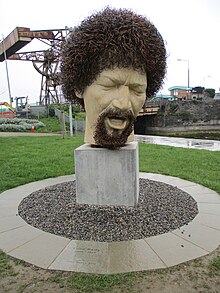 Sculpture of Luke Kelly on Sheriff Street by Vera Klute. Unveiled in 2019
Sculpture of Luke Kelly on Sheriff Street by Vera Klute. Unveiled in 2019 -
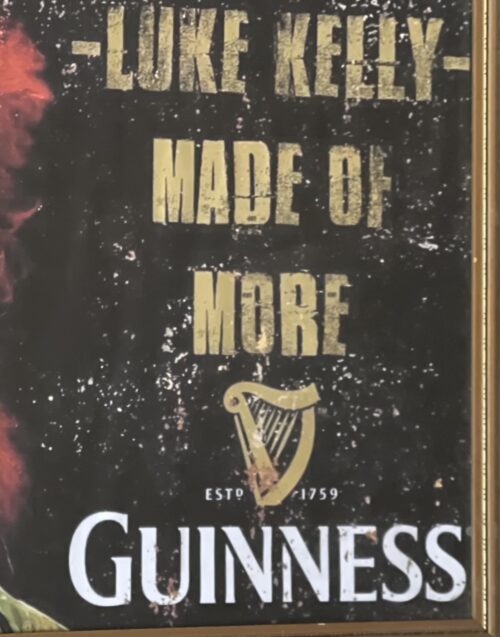
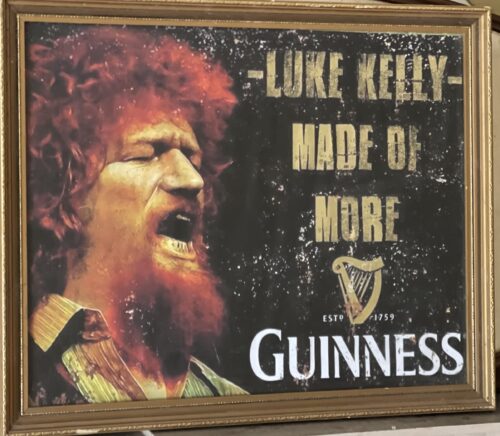 55cm x 45cm Luke Kelly (17 November 1940 – 30 January 1984) was an Irish singer, folk musician and actor from Dublin, Ireland. Born into a working-class household in Dublin city, Kelly moved to England in his late teens and by his early 20s had become involved in a folk music revival. Returning to Dublin in the 1960s, he is noted as a founding member of the band The Dubliners in 1962. Becoming known for his distinctive singing style, and sometimes political messages, the Irish Postand other commentators have regarded Kelly as one of Ireland's greatest folk singers. Early life Luke Kelly was born into a working-class family in Lattimore Cottages at 1 Sheriff Street.His maternal grandmother, who was a MacDonald from Scotland, lived with the family until her death in 1953. His father who was Irish- also named Luke- was shot and severely wounded as a child by British soldiers from the King's Own Scottish Borderers during the 1914 Bachelor's Walk massacre.His father worked all his life in Jacob's biscuit factory and enjoyed playing football. The elder Luke was a keen singer: Luke junior's brother Paddy later recalled that "he had this talent... to sing negro spirituals by people like Paul Robeson, we used to sit around and join in — that was our entertainment". After Dublin Corporation demolished Lattimore Cottages in 1942, the Kellys became the first family to move into the St. Laurence O’Toole flats, where Luke spent the bulk of his childhood, although the family were forced to move by a fire in 1953 and settled in the Whitehall area. Both Luke and Paddy played club Gaelic football and soccer as children. Kelly left school at thirteen and after a number of years of odd-jobbing, he went to England in 1958.[6] Working at steel fixing with his brother Paddy on a building site in Wolverhampton, he was apparently sacked after asking for higher pay. He worked a number of odd jobs, including a period as a vacuum cleaner salesman.Describing himself as a beatnik, he travelled Northern England in search of work, summarising his life in this period as "cleaning lavatories, cleaning windows, cleaning railways, but very rarely cleaning my face".
55cm x 45cm Luke Kelly (17 November 1940 – 30 January 1984) was an Irish singer, folk musician and actor from Dublin, Ireland. Born into a working-class household in Dublin city, Kelly moved to England in his late teens and by his early 20s had become involved in a folk music revival. Returning to Dublin in the 1960s, he is noted as a founding member of the band The Dubliners in 1962. Becoming known for his distinctive singing style, and sometimes political messages, the Irish Postand other commentators have regarded Kelly as one of Ireland's greatest folk singers. Early life Luke Kelly was born into a working-class family in Lattimore Cottages at 1 Sheriff Street.His maternal grandmother, who was a MacDonald from Scotland, lived with the family until her death in 1953. His father who was Irish- also named Luke- was shot and severely wounded as a child by British soldiers from the King's Own Scottish Borderers during the 1914 Bachelor's Walk massacre.His father worked all his life in Jacob's biscuit factory and enjoyed playing football. The elder Luke was a keen singer: Luke junior's brother Paddy later recalled that "he had this talent... to sing negro spirituals by people like Paul Robeson, we used to sit around and join in — that was our entertainment". After Dublin Corporation demolished Lattimore Cottages in 1942, the Kellys became the first family to move into the St. Laurence O’Toole flats, where Luke spent the bulk of his childhood, although the family were forced to move by a fire in 1953 and settled in the Whitehall area. Both Luke and Paddy played club Gaelic football and soccer as children. Kelly left school at thirteen and after a number of years of odd-jobbing, he went to England in 1958.[6] Working at steel fixing with his brother Paddy on a building site in Wolverhampton, he was apparently sacked after asking for higher pay. He worked a number of odd jobs, including a period as a vacuum cleaner salesman.Describing himself as a beatnik, he travelled Northern England in search of work, summarising his life in this period as "cleaning lavatories, cleaning windows, cleaning railways, but very rarely cleaning my face".Musical beginnings
Kelly had been interested in music during his teenage years: he regularly attended céilithe with his sister Mona and listened to American vocalists including: Fats Domino, Al Jolson, Frank Sinatra and Perry Como. He also had an interest in theatre and musicals, being involved with the staging of plays by Dublin's Marian Arts Society. The first folk club he came across was in the Bridge Hotel, Newcastle upon Tyne in early 1960.Having already acquired the use of a banjo, he started memorising songs. In Leeds he brought his banjo to sessions in McReady's pub. The folk revival was under way in England: at the centre of it was Ewan MacColl who scripted a radio programme called Ballads and Blues. A revival in the skiffle genre also injected a certain energy into folk singing at the time. Kelly started busking. On a trip home he went to a fleadh cheoil in Milltown Malbay on the advice of Johnny Moynihan. He listened to recordings of Woody Guthrie and Pete Seeger. He also developed his political convictions which, as Ronnie Drew pointed out after his death, he stuck to throughout his life. As Drew also pointed out, he "learned to sing with perfect diction". Kelly befriended Sean Mulready in Birmingham and lived in his home for a period.Mulready was a teacher who was forced from his job in Dublin because of his communist beliefs. Mulready had strong music links; a sister, Kathleen Moynihan was a founder member of Comhaltas Ceoltóirí Éireann, and he was related by marriage to Festy Conlon, the County Galway whistle player. Mulready's brother-in-law, Ned Stapleton, taught Kelly "The Rocky Road to Dublin".During this period he studied literature and politics under the tutelage of Mulready, his wife Mollie, and Marxist classicist George Derwent Thomson: Kelly later stated that his interest in music grew parallel to his interest in politics. Kelly bought his first banjo, which had five strings and a long neck, and played it in the style of Pete Seeger and Tommy Makem. At the same time, Kelly began a habit of reading, and also began playing golf on one of Birmingham's municipal courses. He got involved in the Jug O'Punch folk club run by Ian Campbell. He befriended Dominic Behan and they performed in folk clubs and Irish pubs from London to Glasgow. In London pubs, like "The Favourite", he would hear street singer Margaret Barry and musicians in exile like Roger Sherlock, Seamus Ennis, Bobby Casey and Mairtín Byrnes. Luke Kelly was by now active in the Connolly Association, a left-wing grouping strongest among the emigres in England, and he also joined the Young Communist League: he toured Irish pubs playing his set and selling the Connolly Association's newspaper The Irish Democrat. By 1962 George Derwent Thomson had offered him the opportunity to further his educational and political development by attending university in Prague. However, Kelly turned down the offer in favour of pursuing his career in folk music. He was also to start frequenting Ewan MacColl and Peggy Seeger's Singer Club in London.The Dubliners
In 1961 there was a folk music revival or "ballad boom", as it was later termed, in waiting in Ireland.The Abbey Tavern sessions in Howth were the forerunner to sessions in the Hollybrook, Clontarf, the International Bar and the Grafton Cinema. Luke Kelly returned to Dublin in 1962. O'Donoghue's Pub was already established as a session house and soon Kelly was singing with, among others, Ronnie Drew and Barney McKenna. Other early people playing at O'Donoghues included The Fureys, father and sons, John Keenan and Sean Og McKenna, Johnny Moynihan, Andy Irvine, Seamus Ennis, Willy Clancy and Mairtin Byrnes. A concert John Molloy organised in the Hibernian Hotel led to his "Ballad Tour of Ireland" with the Ronnie Drew Ballad Group (billed in one town as the Ronnie Drew Ballet Group). This tour led to the Abbey Tavern and the Royal Marine Hotel and then to jam-packed sessions in the Embankment, Tallaght. Ciarán Bourke joined the group, followed later by John Sheahan. They renamed themselves The Dubliners at Kelly's suggestion, as he was reading James Joyce's book of short stories, entitled Dubliners, at the time.Kelly was the leading vocalist for the group's eponymous debut album in 1964, which included his rendition of "The Rocky Road to Dublin". Barney McKenna later noted that Kelly was the only singer he'd heard sing it to the rhythm it was played on the fiddle. In 1964 Luke Kelly left the group for nearly two years and was replaced by Bobby Lynch and John Sheahan. Kelly went with Deirdre O'Connell, founder of the Focus Theatre, whom he was to marry the following year, back to London and became involved in Ewan MacColl's "gathering". The Critics, as it was called, was formed to explore folk traditions and help young singers. During this period he retained his political commitments, becoming increasingly active in the Campaign for Nuclear Disarmament. Kelly also met and befriended Michael O'Riordan, the General Secretary of the Irish Workers' Party, and the two developed a "personal-political friendship". Kelly endorsed O'Riordan for election, and held a rally in his name during campaigning in 1965.In 1965, he sang 'The Rocky Road to Dublin' with Liam Clancy on his first, self-titled solo album. Bobby Lynch left The Dubliners, John Sheahan and Kelly rejoined. They recorded an album in the Gate Theatre, Dublin, played the Cambridge Folk Festival and recorded Irish Night Out, a live album with, among others, exiles Margaret Barry, Michael Gorman and Jimmy Powers. They also played a concert in the National Stadium in Dublin with Pete Seeger as special guest. They were on the road to success: Top Twenty hits with "Seven Drunken Nights" and "The Black Velvet Band", The Ed Sullivan Show in 1968 and a tour of New Zealand and Australia. The ballad boom in Ireland was becoming increasingly commercialised with bar and pub owners building ever larger venues for pay-in performances. Ewan MacColl and Peggy Seeger on a visit to Dublin expressed concern to Kelly about his drinking.[citation needed] Christy Moore and Kelly became acquainted in the 1960s.During his Planxty days, Moore got to know Kelly well. In 1972 The Dubliners themselves performed in Richard's Cork Leg, based on the "incomplete works" of Brendan Behan. In 1973, Kelly took to the stage performing as King Herod in Jesus Christ Superstar. The arrival of a new manager for The Dubliners, Derry composer Phil Coulter, resulted in a collaboration that produced three of Kelly's most notable performances: “The Town I Loved So Well”, "Hand me Down my Bible", and “Scorn Not His Simplicity”, a song about Phil's son who had Down Syndrome.Kelly had such respect for the latter song that he only performed it once for a television recording and rarely, if ever, sang it at the Dubliners' often boisterous events. His interpretations of “On Raglan Road” and "Scorn Not His Simplicity" became significant points of reference in Irish folk music.His version of "Raglan Road" came about when the poem's author, Patrick Kavanagh, heard him singing in a Dublin pub, and approached Kelly to say that he should sing the poem (which is set to the tune of “The Dawning of the Day”). Kelly remained a politically engaged musician, becoming a supporter of the movement against South African apartheid and performing at benefit concerts for the Irish Traveller community,and many of the songs he recorded dealt with social issues, the arms race and the Cold War, trade unionism and Irish republicanism, ("The Springhill Disaster", "Joe Hill", "The Button Pusher", "Alabama 1958" and "God Save Ireland" all being examples of his concerns).Personal life
Luke Kelly married Deirdre O'Connell in 1965, but they separated in the early 1970s.Kelly spent the last eight years of his life living with his partner Madeleine Seiler, who is from Germany.Final years
Kelly's health deteriorated in the 1970s. Kelly himself spoke about his problems with alcohol. On 30 June 1980 during a concert in the Cork Opera House he collapsed on the stage. He had already suffered for some time from migraines and forgetfulness - including forgetting what country he was in whilst visiting Iceland - which had been ascribed to his intense schedule, alcohol consumption, and "party lifestyle". A brain tumour was diagnosed.Although Kelly toured with the Dubliners after enduring an operation, his health deteriorated further. He forgot lyrics and had to take longer breaks in concerts as he felt weak. In addition following his emergency surgery after his collapse in Cork, he became more withdrawn, preferring the company of Madeleine at home to performing.On his European tour he managed to perform with the band for most of the show in Carre for their Live in Carre album. However, in autumn 1983 he had to leave the stage in Traun, Austria and again in Mannheim, Germany. Shortly after this, he had to cancel the tour of southern Germany, and after a short stay in hospital in Heidelberg he was flown back to Dublin. After another operation he spent Christmas with his family but was taken into hospital again in the New Year, where he died on 30 January 1984.Kelly's funeral in Whitehall attracted thousands of mourners from across Ireland.His gravestone in Glasnevin Cemetery, Dublin, bears the inscription: Luke Kelly – Dubliner. Sean Cannon took Kelly's place in The Dubliners. He had been performing with the Dubliners since 1982,due to the deterioration of Kelly's health.Legacy
Luke Kelly's legacy and contributions to Irish music and culture have been described as "iconic" and have been captured in a number of documentaries and anthologies. The influence of his Scottish grandmother was influential in Kelly's help in preserving important traditional Scottish songs such as "Mormond Braes", the Canadian folk song "Peggy Gordon", "Robert Burns", "Parcel of Rogues", "Tibbie Dunbar", Hamish Henderson's "Freedom Come-All-Ye", and Thurso Berwick's "Scottish Breakaway". The Ballybough Bridge in the north inner city of Dublin was renamed the Luke Kelly Bridge, and in November 2004 Dublin City Council voted unanimously to erect a bronze statue of Luke Kelly. However, the Dublin Docklands Authority subsequently stated that it could no longer afford to fund the statue. In 2010, councillor Christy Burke of Dublin City Council appealed to members of the music community including Bono, Phil Coulter and Enya to help build it. Paddy Reilly recorded a tribute to Kelly entitled "The Dublin Minstrel". It featured on his Gold And Silver Years, Celtic Collections and the Essential Paddy Reilly CD's. The Dubliners recorded the song on their Live at Vicar Street DVD/CD. The song was composed by Declan O'Donoghue, the Racing Correspondent of The Irish Sun. At Christmas 2005 writer-director Michael Feeney Callan's documentary, Luke Kelly: The Performer, was released and outsold U2's latest DVD during the festive season and into 2006, acquiring platinum sales status. The documentary told Kelly's story through the words of the Dubliners, Donovan, Ralph McTell and others and featured full versions of rarely seen performances such as the early sixties' Ed Sullivan Show. A later documentary, Luke Kelly: Prince of the City, was also well received. Two statues of Kelly were unveiled in Dublin in January 2019, to mark the 35th anniversary of his death.One, a life-size seated bronze by John Coll, is on South King Street. The second sculpture, a marble portrait head by Vera Klute, is on Sheriff Street. The Klute sculpture was vandalised on several occasions in 2019 and 2020, in each case being restored by graffiti-removal specialists. Sculpture of Luke Kelly on Sheriff Street by Vera Klute. Unveiled in 2019
Sculpture of Luke Kelly on Sheriff Street by Vera Klute. Unveiled in 2019 -
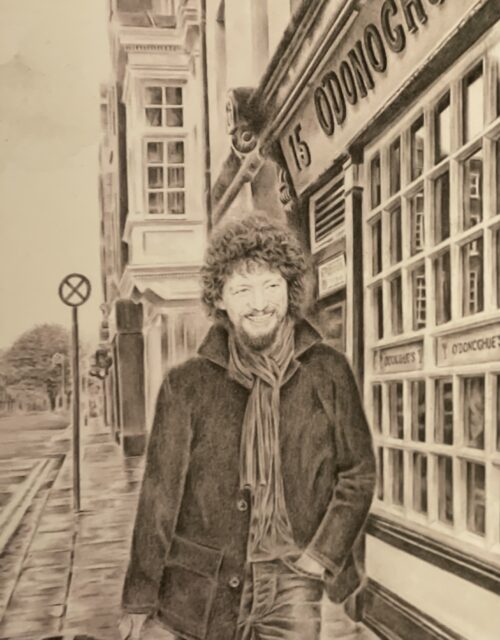
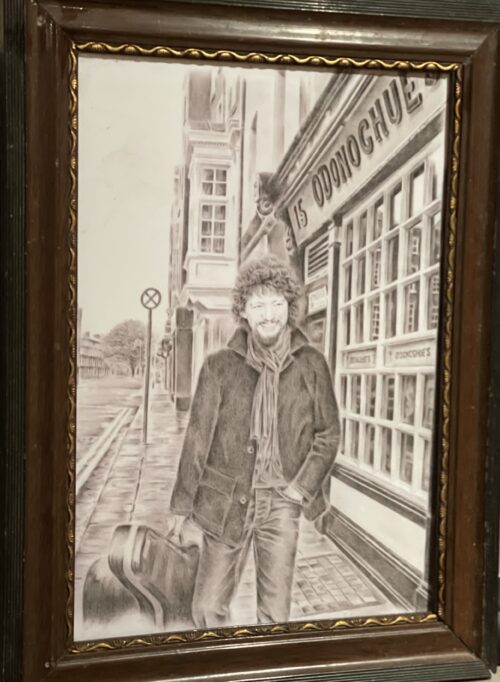 40cm x 30cm Luke Kelly (17 November 1940 – 30 January 1984) was an Irish singer, folk musician and actor from Dublin, Ireland. Born into a working-class household in Dublin city, Kelly moved to England in his late teens and by his early 20s had become involved in a folk music revival. Returning to Dublin in the 1960s, he is noted as a founding member of the band The Dubliners in 1962. Becoming known for his distinctive singing style, and sometimes political messages, the Irish Postand other commentators have regarded Kelly as one of Ireland's greatest folk singers. Early life Luke Kelly was born into a working-class family in Lattimore Cottages at 1 Sheriff Street.His maternal grandmother, who was a MacDonald from Scotland, lived with the family until her death in 1953. His father who was Irish- also named Luke- was shot and severely wounded as a child by British soldiers from the King's Own Scottish Borderers during the 1914 Bachelor's Walk massacre.His father worked all his life in Jacob's biscuit factory and enjoyed playing football. The elder Luke was a keen singer: Luke junior's brother Paddy later recalled that "he had this talent... to sing negro spirituals by people like Paul Robeson, we used to sit around and join in — that was our entertainment". After Dublin Corporation demolished Lattimore Cottages in 1942, the Kellys became the first family to move into the St. Laurence O’Toole flats, where Luke spent the bulk of his childhood, although the family were forced to move by a fire in 1953 and settled in the Whitehall area. Both Luke and Paddy played club Gaelic football and soccer as children. Kelly left school at thirteen and after a number of years of odd-jobbing, he went to England in 1958.[6] Working at steel fixing with his brother Paddy on a building site in Wolverhampton, he was apparently sacked after asking for higher pay. He worked a number of odd jobs, including a period as a vacuum cleaner salesman.Describing himself as a beatnik, he travelled Northern England in search of work, summarising his life in this period as "cleaning lavatories, cleaning windows, cleaning railways, but very rarely cleaning my face".
40cm x 30cm Luke Kelly (17 November 1940 – 30 January 1984) was an Irish singer, folk musician and actor from Dublin, Ireland. Born into a working-class household in Dublin city, Kelly moved to England in his late teens and by his early 20s had become involved in a folk music revival. Returning to Dublin in the 1960s, he is noted as a founding member of the band The Dubliners in 1962. Becoming known for his distinctive singing style, and sometimes political messages, the Irish Postand other commentators have regarded Kelly as one of Ireland's greatest folk singers. Early life Luke Kelly was born into a working-class family in Lattimore Cottages at 1 Sheriff Street.His maternal grandmother, who was a MacDonald from Scotland, lived with the family until her death in 1953. His father who was Irish- also named Luke- was shot and severely wounded as a child by British soldiers from the King's Own Scottish Borderers during the 1914 Bachelor's Walk massacre.His father worked all his life in Jacob's biscuit factory and enjoyed playing football. The elder Luke was a keen singer: Luke junior's brother Paddy later recalled that "he had this talent... to sing negro spirituals by people like Paul Robeson, we used to sit around and join in — that was our entertainment". After Dublin Corporation demolished Lattimore Cottages in 1942, the Kellys became the first family to move into the St. Laurence O’Toole flats, where Luke spent the bulk of his childhood, although the family were forced to move by a fire in 1953 and settled in the Whitehall area. Both Luke and Paddy played club Gaelic football and soccer as children. Kelly left school at thirteen and after a number of years of odd-jobbing, he went to England in 1958.[6] Working at steel fixing with his brother Paddy on a building site in Wolverhampton, he was apparently sacked after asking for higher pay. He worked a number of odd jobs, including a period as a vacuum cleaner salesman.Describing himself as a beatnik, he travelled Northern England in search of work, summarising his life in this period as "cleaning lavatories, cleaning windows, cleaning railways, but very rarely cleaning my face".Musical beginnings
Kelly had been interested in music during his teenage years: he regularly attended céilithe with his sister Mona and listened to American vocalists including: Fats Domino, Al Jolson, Frank Sinatra and Perry Como. He also had an interest in theatre and musicals, being involved with the staging of plays by Dublin's Marian Arts Society. The first folk club he came across was in the Bridge Hotel, Newcastle upon Tyne in early 1960.Having already acquired the use of a banjo, he started memorising songs. In Leeds he brought his banjo to sessions in McReady's pub. The folk revival was under way in England: at the centre of it was Ewan MacColl who scripted a radio programme called Ballads and Blues. A revival in the skiffle genre also injected a certain energy into folk singing at the time. Kelly started busking. On a trip home he went to a fleadh cheoil in Milltown Malbay on the advice of Johnny Moynihan. He listened to recordings of Woody Guthrie and Pete Seeger. He also developed his political convictions which, as Ronnie Drew pointed out after his death, he stuck to throughout his life. As Drew also pointed out, he "learned to sing with perfect diction". Kelly befriended Sean Mulready in Birmingham and lived in his home for a period.Mulready was a teacher who was forced from his job in Dublin because of his communist beliefs. Mulready had strong music links; a sister, Kathleen Moynihan was a founder member of Comhaltas Ceoltóirí Éireann, and he was related by marriage to Festy Conlon, the County Galway whistle player. Mulready's brother-in-law, Ned Stapleton, taught Kelly "The Rocky Road to Dublin".During this period he studied literature and politics under the tutelage of Mulready, his wife Mollie, and Marxist classicist George Derwent Thomson: Kelly later stated that his interest in music grew parallel to his interest in politics. Kelly bought his first banjo, which had five strings and a long neck, and played it in the style of Pete Seeger and Tommy Makem. At the same time, Kelly began a habit of reading, and also began playing golf on one of Birmingham's municipal courses. He got involved in the Jug O'Punch folk club run by Ian Campbell. He befriended Dominic Behan and they performed in folk clubs and Irish pubs from London to Glasgow. In London pubs, like "The Favourite", he would hear street singer Margaret Barry and musicians in exile like Roger Sherlock, Seamus Ennis, Bobby Casey and Mairtín Byrnes. Luke Kelly was by now active in the Connolly Association, a left-wing grouping strongest among the emigres in England, and he also joined the Young Communist League: he toured Irish pubs playing his set and selling the Connolly Association's newspaper The Irish Democrat. By 1962 George Derwent Thomson had offered him the opportunity to further his educational and political development by attending university in Prague. However, Kelly turned down the offer in favour of pursuing his career in folk music. He was also to start frequenting Ewan MacColl and Peggy Seeger's Singer Club in London.The Dubliners
In 1961 there was a folk music revival or "ballad boom", as it was later termed, in waiting in Ireland.The Abbey Tavern sessions in Howth were the forerunner to sessions in the Hollybrook, Clontarf, the International Bar and the Grafton Cinema. Luke Kelly returned to Dublin in 1962. O'Donoghue's Pub was already established as a session house and soon Kelly was singing with, among others, Ronnie Drew and Barney McKenna. Other early people playing at O'Donoghues included The Fureys, father and sons, John Keenan and Sean Og McKenna, Johnny Moynihan, Andy Irvine, Seamus Ennis, Willy Clancy and Mairtin Byrnes. A concert John Molloy organised in the Hibernian Hotel led to his "Ballad Tour of Ireland" with the Ronnie Drew Ballad Group (billed in one town as the Ronnie Drew Ballet Group). This tour led to the Abbey Tavern and the Royal Marine Hotel and then to jam-packed sessions in the Embankment, Tallaght. Ciarán Bourke joined the group, followed later by John Sheahan. They renamed themselves The Dubliners at Kelly's suggestion, as he was reading James Joyce's book of short stories, entitled Dubliners, at the time.Kelly was the leading vocalist for the group's eponymous debut album in 1964, which included his rendition of "The Rocky Road to Dublin". Barney McKenna later noted that Kelly was the only singer he'd heard sing it to the rhythm it was played on the fiddle. In 1964 Luke Kelly left the group for nearly two years and was replaced by Bobby Lynch and John Sheahan. Kelly went with Deirdre O'Connell, founder of the Focus Theatre, whom he was to marry the following year, back to London and became involved in Ewan MacColl's "gathering". The Critics, as it was called, was formed to explore folk traditions and help young singers. During this period he retained his political commitments, becoming increasingly active in the Campaign for Nuclear Disarmament. Kelly also met and befriended Michael O'Riordan, the General Secretary of the Irish Workers' Party, and the two developed a "personal-political friendship". Kelly endorsed O'Riordan for election, and held a rally in his name during campaigning in 1965.In 1965, he sang 'The Rocky Road to Dublin' with Liam Clancy on his first, self-titled solo album. Bobby Lynch left The Dubliners, John Sheahan and Kelly rejoined. They recorded an album in the Gate Theatre, Dublin, played the Cambridge Folk Festival and recorded Irish Night Out, a live album with, among others, exiles Margaret Barry, Michael Gorman and Jimmy Powers. They also played a concert in the National Stadium in Dublin with Pete Seeger as special guest. They were on the road to success: Top Twenty hits with "Seven Drunken Nights" and "The Black Velvet Band", The Ed Sullivan Show in 1968 and a tour of New Zealand and Australia. The ballad boom in Ireland was becoming increasingly commercialised with bar and pub owners building ever larger venues for pay-in performances. Ewan MacColl and Peggy Seeger on a visit to Dublin expressed concern to Kelly about his drinking.[citation needed] Christy Moore and Kelly became acquainted in the 1960s.During his Planxty days, Moore got to know Kelly well. In 1972 The Dubliners themselves performed in Richard's Cork Leg, based on the "incomplete works" of Brendan Behan. In 1973, Kelly took to the stage performing as King Herod in Jesus Christ Superstar. The arrival of a new manager for The Dubliners, Derry composer Phil Coulter, resulted in a collaboration that produced three of Kelly's most notable performances: “The Town I Loved So Well”, "Hand me Down my Bible", and “Scorn Not His Simplicity”, a song about Phil's son who had Down Syndrome.Kelly had such respect for the latter song that he only performed it once for a television recording and rarely, if ever, sang it at the Dubliners' often boisterous events. His interpretations of “On Raglan Road” and "Scorn Not His Simplicity" became significant points of reference in Irish folk music.His version of "Raglan Road" came about when the poem's author, Patrick Kavanagh, heard him singing in a Dublin pub, and approached Kelly to say that he should sing the poem (which is set to the tune of “The Dawning of the Day”). Kelly remained a politically engaged musician, becoming a supporter of the movement against South African apartheid and performing at benefit concerts for the Irish Traveller community,and many of the songs he recorded dealt with social issues, the arms race and the Cold War, trade unionism and Irish republicanism, ("The Springhill Disaster", "Joe Hill", "The Button Pusher", "Alabama 1958" and "God Save Ireland" all being examples of his concerns).Personal life
Luke Kelly married Deirdre O'Connell in 1965, but they separated in the early 1970s.Kelly spent the last eight years of his life living with his partner Madeleine Seiler, who is from Germany.Final years
Kelly's health deteriorated in the 1970s. Kelly himself spoke about his problems with alcohol. On 30 June 1980 during a concert in the Cork Opera House he collapsed on the stage. He had already suffered for some time from migraines and forgetfulness - including forgetting what country he was in whilst visiting Iceland - which had been ascribed to his intense schedule, alcohol consumption, and "party lifestyle". A brain tumour was diagnosed.Although Kelly toured with the Dubliners after enduring an operation, his health deteriorated further. He forgot lyrics and had to take longer breaks in concerts as he felt weak. In addition following his emergency surgery after his collapse in Cork, he became more withdrawn, preferring the company of Madeleine at home to performing.On his European tour he managed to perform with the band for most of the show in Carre for their Live in Carre album. However, in autumn 1983 he had to leave the stage in Traun, Austria and again in Mannheim, Germany. Shortly after this, he had to cancel the tour of southern Germany, and after a short stay in hospital in Heidelberg he was flown back to Dublin. After another operation he spent Christmas with his family but was taken into hospital again in the New Year, where he died on 30 January 1984.Kelly's funeral in Whitehall attracted thousands of mourners from across Ireland.His gravestone in Glasnevin Cemetery, Dublin, bears the inscription: Luke Kelly – Dubliner. Sean Cannon took Kelly's place in The Dubliners. He had been performing with the Dubliners since 1982,due to the deterioration of Kelly's health.Legacy
Luke Kelly's legacy and contributions to Irish music and culture have been described as "iconic" and have been captured in a number of documentaries and anthologies. The influence of his Scottish grandmother was influential in Kelly's help in preserving important traditional Scottish songs such as "Mormond Braes", the Canadian folk song "Peggy Gordon", "Robert Burns", "Parcel of Rogues", "Tibbie Dunbar", Hamish Henderson's "Freedom Come-All-Ye", and Thurso Berwick's "Scottish Breakaway". The Ballybough Bridge in the north inner city of Dublin was renamed the Luke Kelly Bridge, and in November 2004 Dublin City Council voted unanimously to erect a bronze statue of Luke Kelly. However, the Dublin Docklands Authority subsequently stated that it could no longer afford to fund the statue. In 2010, councillor Christy Burke of Dublin City Council appealed to members of the music community including Bono, Phil Coulter and Enya to help build it. Paddy Reilly recorded a tribute to Kelly entitled "The Dublin Minstrel". It featured on his Gold And Silver Years, Celtic Collections and the Essential Paddy Reilly CD's. The Dubliners recorded the song on their Live at Vicar Street DVD/CD. The song was composed by Declan O'Donoghue, the Racing Correspondent of The Irish Sun. At Christmas 2005 writer-director Michael Feeney Callan's documentary, Luke Kelly: The Performer, was released and outsold U2's latest DVD during the festive season and into 2006, acquiring platinum sales status. The documentary told Kelly's story through the words of the Dubliners, Donovan, Ralph McTell and others and featured full versions of rarely seen performances such as the early sixties' Ed Sullivan Show. A later documentary, Luke Kelly: Prince of the City, was also well received. Two statues of Kelly were unveiled in Dublin in January 2019, to mark the 35th anniversary of his death.One, a life-size seated bronze by John Coll, is on South King Street. The second sculpture, a marble portrait head by Vera Klute, is on Sheriff Street. The Klute sculpture was vandalised on several occasions in 2019 and 2020, in each case being restored by graffiti-removal specialists. Sculpture of Luke Kelly on Sheriff Street by Vera Klute. Unveiled in 2019
Sculpture of Luke Kelly on Sheriff Street by Vera Klute. Unveiled in 2019 -
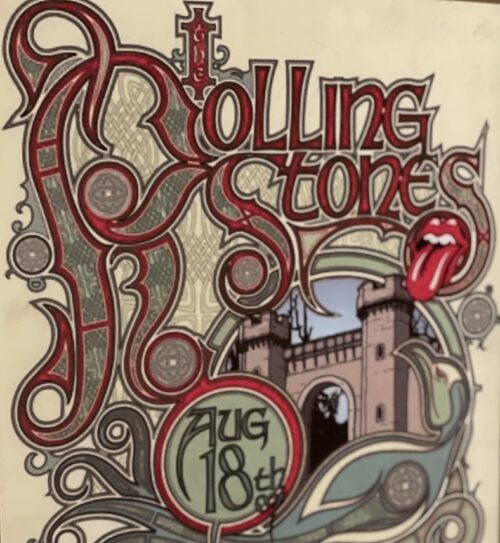
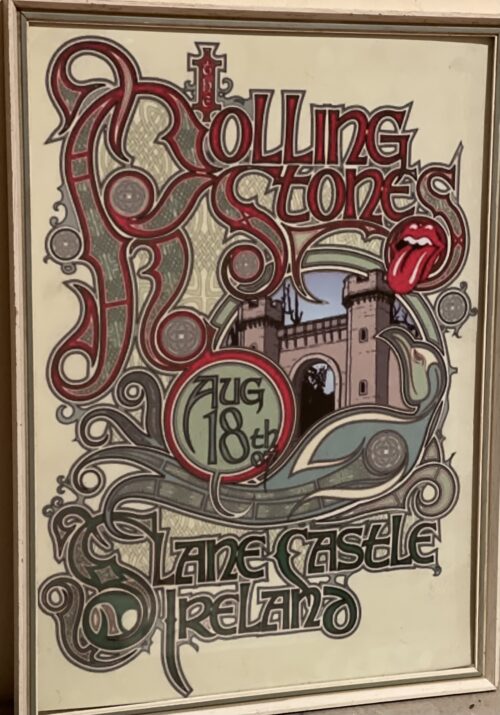 42cm x 31cm
42cm x 31cmSpeaking to the Irish Times in 2007 about the Rolling Stones’s 1982 concert, Slane Castle owner Lord Henry Mount Charles said Ireland had never seen anything like it before.
“The weather was beautiful, the show was magic. Mick Jagger came down the Thursday before the show and had dinner in the castle and the production crew slept in the drawing room of the castle the night before the show. It had an almost gypsy-like quality about it.”
Some 70,000 music fans paid £12 each for a ticket in 1982. Thousands arrived the night before to camp out wherever they could find a pitch around the village. Fans complained of being charged £5 for a six-pack of beer and £1 for a can of Coke, with one newspaper report at the time remarking that “every kind of huckster, three-card-trick man and itinerant salesman had a stall in Slane”.
The day of the concert, July 24th, saw brilliant sunshine, with those who weren’t sprayed by two massive water hoses taking advantage of the lack of security to swim in the River Boyne.
After the warm-up acts, which included the Chieftains, the Rolling Stones bounded on, with Mick Jagger proclaiming: “It’s great to be back in Dublin. After 16 years, it’s very nice of you to come, so let’s spend the night together.” Jagger showed a hazy knowledge of Irish geography and also of the band’s own history. They had last played Ireland in 1965.

Aerial view of the 80,000-strong crowd at the Rolling Stones in Slane, July 1982. Photograph: Tom Lawlor Concert report, Slane, 1982, by Maev Kennedy
They were a pretty audience. They brought their babies and some of them brought their mammies.In the interminable gaps between the live music they shinned over the 10-foot fence to leap into the Boyne and every mother’s son and daughter of them was decently clothed. Some stripped down to pants, some modestly leaped in fully clothed.
A ferocious, savage, vicious, terrifying gang of Hell’s Angels, from the badlands of Waterford, sat in a reeking huddle on the grass, shunned by 20 yards by the rest of the crowd. Hunched menacingly in their colours, they were eating Choc-Ices.
The crowd got younger all the way into the centre. Half way down were the 20-year-olds, sprawled out on rugs with their wine, in plastic bottles as per instructions, and their dope. The worst crime they committed was to fall sound asleep in the hot sun, and some slept right through the Stones.
Only in the first 10 rows, damped down by fire hoses and at one ecstatic moment sprayed with fire hose by Mick Jagger HIMSELF was there that wild dangerous electric excitement the media associates with huge rock concerts. They leaped and shrieked and held up imploring arms.
“You’re all right!” Mick Jagger yelled at them. “You’re not too bad yourself!” they shouted back.
Up at the top of the hill, up at the top of a 60 foot pine tree, a lunatic fan leaped up and down hysterically.
“It’s great to be back in Dublin,” Jagger assured them. Nobody had the heart to correct him.
By the last chords of the opening Under My Thumb a steady stream of denim was pouring up the slopes and out the gate. They’d waited 10 hours to see the Rolling Stones, and they’d seen the Rolling Stones; they knew exactly what they were going to play, so they left, perfectly happy.
People kept comparing the Stones concert to the Pope’s visit, but nobody ever left a Papal gig before the Last Blessing.

Returning after 25 years to Slane Castle, Mick Jagger performs to a crowd of 70,000 on Saturday 18th August, 2007. Photograph: Kate Geraghty Concert report, Slane, August 2007
“Is it a bit much?” Mick Jagger asked while the central section of the massive stage, on which the Rolling Stones stood, levitated away from their backing band and moved through the awestruck crowd.
Excess is a term that has long been associated with the Stones, and their hi-tech, high energy performance seemed to strike the right chord with fans.
Concert goers who had paid some €60 extra for “Gold Circle” tickets, which entitled them to a standing space at front of the stage, most certainly got their money’s worth, as they stood a hair’s breadth away from their idols. Eventually the stage retracted and the show continued as before.
However, for some fans, the moment they stood beside the Rolling Stones will live long in memory.
Mick Jagger remains a remarkably competent frontman, with an impressive swagger, and his banter during the interludes had the crowd hanging on his every word.
He gave fans an obligatory few words “as Gaeilge” and to his credit, and much to the fans’ delight, his diction was spot on.
Another big cheer came when Jagger introduced guitarist Ronnie Wood to the crowd, describing him as a man from Naas, where Wood now has a home. Wood grabbed the microphone from his mate and bellowed “come on the Royals”, to a somewhat mixed reaction.
Dave Fanning: Slane 1982 was ‘a big circus’
Dave Fanning spoke to The Irish Times in 2007: “I remember the first Slane, standing backstage and watching Phil Lynott arrive by helicopter. There wasn’t such a big vibe about hanging around the castle – everyone was either in the crowd or backstage.
“1987 was memorable because I was seeing one of my favourite people fail miserably: David Bowie. That was also the year I got my binoculars nicked.
“The Rolling Stones in 1982 was like a great big circus, and the stage had these two big catwalks that spread right out into the crowd like a pair of wings. When Keith Richards walked down one of the catwalks, he was standing just 50 yards from us, and that was cool.“Bruce was the biggest thing going in 1985, but Slane was the biggest crowd he had played to up till then. Bob Dylan did a solid enough gig in ’84, but he played as if he was in the Baggot.
“Queen was the first Slane where it rained, and there was a bad vibe with the crowd down the front, because there were so many people there.”

Returning after 25 years to Slane Castle, Mick Jagger performs to a crowd of 70,000 on Saturday 18th August, 2007. Photograph: Kate Geraghty BP Fallon: 1982 wasn’t a patch on 2007
BP Fallon spoke to The Irish Times in 2007 about his memories of 1980s Slane: “Dylan was the most memorable one for me – he had a great band which included Mick Taylor (ex-Rolling Stones) and Ian McLagan (ex-Faces).
“The worst Slane was definitely David Bowie – all that Glass Spider rubbish and those dancers. Terrible. I didn’t go to Queen on principle, because they had played in South Africa during the apartheid regime. I saw The Rolling Stones gig, but it wasn’t a patch on the [2007] tour.”
-

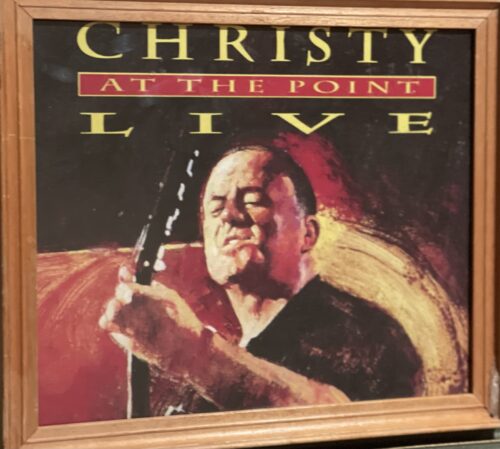 28cm x 33cm Christy Moore is one of Ireland's best known folk singer's, songwriter's and guitarist. He is one of the founding members of Planxty and Moving Hearts. His first album, Paddy on the Road was recorded with Dominic Behan in 1969. In 2007, he was named as Ireland's greatest living musician in RTÉ's People of the Year Awards.
28cm x 33cm Christy Moore is one of Ireland's best known folk singer's, songwriter's and guitarist. He is one of the founding members of Planxty and Moving Hearts. His first album, Paddy on the Road was recorded with Dominic Behan in 1969. In 2007, he was named as Ireland's greatest living musician in RTÉ's People of the Year Awards.Early life
Moore was born in Newbridge, County Kildare, Ireland and attended Dominican College Secondary School. He was originally a bank employee who wanted to express himself using traditional music. During a bank strike in 1966, which lasted twelve weeks, he went to England, as many striking officials did, but didn't return when the strike was settled. "I had a wild and wonderful time in England, with no bank manager looking over my shoulder," he said. Doing general labouring work, he frequented the folk clubs and the Irish music pubs where he met Seamus Ennis, Margaret Barry, Luke Kelly, Martin Byrnes and many other traditional musicians.When Irish singing trio The Grehan Sisters, with whom Moore was previously acquainted, moved to the north of England from Dublin in 1967, they assisted Moore to get a higher profile by giving him contacts and support slots on their concerts.Musical career
1973 brought his first major release, Prosperous, which brought together the four musicians who shortly thereafter formed Planxty: Liam O'Flynn, Andy Irvine and Dónal Lunny. For a time they called themselves "CLAD", an acronym of their names, but soon decided on Planxty. After leaving Planxty in 1975, Moore continued on his solo career, reforming his old band on occasion (which he has been doing ever since). He also formed the band Moving Hearts with Lunny and five other musicians in 1980. In 1987 he appeared on Gay Byrne's The Late Late Show performing with The Dubliners for their 25th anniversary. In 2000, he published his autobiography, One Voice. Moore's earlier lifestyle resulted in a decline in health and several operations. Moore's battle with alcohol, and subsequent heart operations, have taken their toll. At the end of the 1990s, Moore reduced his workload for medical reasons. Some of Moore's songs are heavily influenced by drink and the effects of drink, his song "Delirium Tremens" being a good example. Listening to Johnny Mulhern's song "Hard Cases" caused Moore to recall the Galway drinking scene with local musicians Mickey Finn, Pete Galligan, Corky and Terry Smith. On 17 April 2009, Moore released his first new studio album in four years, entitled Listen, and promoted it through a series of live gigs. In December 2011, Moore released the album Folk Tale. His next album Where I Come From was released in November 2013 and features a new protest song called "Arthur's Day". The album peaked at number three in the Irish album charts. On the road was released in November 2017, while his most recent album Magic Nightswas released in November 2019.Moore is best known for his political and social commentary which reflects a left-wing, Irish republican perspective, despite the fact that his mother was a Fine Gael county councillor and parliamentary candidate in Kildare. He supported the republican H-Block protestors with the albums H-Block in 1978, the launch of which was raided by the police, and The Spirit of Freedom.He has also recorded songs by the hunger striker Bobby Sands, including "Back Home in Derry" which is based on Gordon Lightfoot's song "The Wreck of the Edmund Fitzgerald". He ceased supporting the military activities of the IRA in 1987 as a result of the Enniskillen bombing. Political songs he has performed throughout his career include Mick Hanly's "On the Blanket" about the protests of republican prisoners, "Viva la Quinta Brigada", about the Irishmen who fought in the Spanish Civil War against Franco, and "Minds Locked Shut" about Bloody Sunday in Derry. Moore has endorsed a long list of leftist support causes, ranging from El Salvador to Mary Robinson in the 1990 presidential election. At the Glastonbury Festival in 2005, he sang about the Palestinian solidarity activist Rachel Corrie. He supported the anti-nuclear movement in Ireland playing in many concerts and at festivals in Carnsore Point for the cause.
Banned songs
"They Never Came Home" is a song about the Stardust fire of 1981 where 48 people died. The song was recorded on the Ordinary Man album and was released on the B-side of a single in 1985. The song achieved notoriety when Moore was taken to court over claims in the song prejudical to an ongoing court case determining compensation. For instance, the song claimed, "hundreds of children are injured and maimed, and all just because the fire exits were chained". Mr Justice Murphy ordered the Ordinary Man album to be withdrawn from the shops, and costs were awarded against Moore. "Another Song is Born" was recorded for the album's re-release. "They Never Came Home" later appeared on his box set and on the album Where I come from.Musical style
His solo style includes driving rhythms on guitar and bodhrán as well as slower ballads.Family
Moore's brother Barry, whose stage name is Luka Bloom, is also a singer-songwriter. His nephew, Conor Byrne, is also a traditional flautist and tin whistle player, with Christy appearing on his Wind Dancer album. Memorable eventsDetention incident, 2004
In October 2004, Moore was stopped and detained by Special Branch officers at the Welsh port of Holyhead, taken into an office and questioned about the lyrics of his songs. The following day, he released a statement saying: "My driver and I were stopped and held for two hours at Holyhead last Monday, under the Prevention of Terrorism Act 2002. My driver and I were held separately in two interrogation rooms. I found the whole experience threatening. I was questioned about the contents of my briefcase." Despite initial reports to the contrary, the singer's van, which was full of musical equipment, was not searched. "I was questioned about lyrics of songs and I was asked a lot of personal questions about members of my family and my children and about my home. At no time was I given any explanation as to why I was being held and interrogated in this manner", he added. He said the fact that Irish people are still being treated this way on their way to Britain is very "saddening". "I had hoped to deal with this matter out of the public domain. But seeing as it has become a news item, I feel the need to offer my side of the story. I found the whole affair quite frightening."Desert Island Discs
In June 2007, Moore was a guest on the BBC radio programme Desert Island Discs.He selected mainly Irish folk music that had inspired him and spoke of personal and political issues that had shaped his life, choosing a set of Uilleann pipes as his luxury item and The English and Scottish Popular Ballads as his choice book.Penguin book of Irish poetry
In 2010 Christy Moore's song "Lisdoonvarna" which he wrote gained entry in The Penguin Book of Irish Poetry.Oxegen
On Sunday 10 July 2011 Moore joined Coldplay on stage at the 2011 Oxegen Festival performing the song "Ride On". -
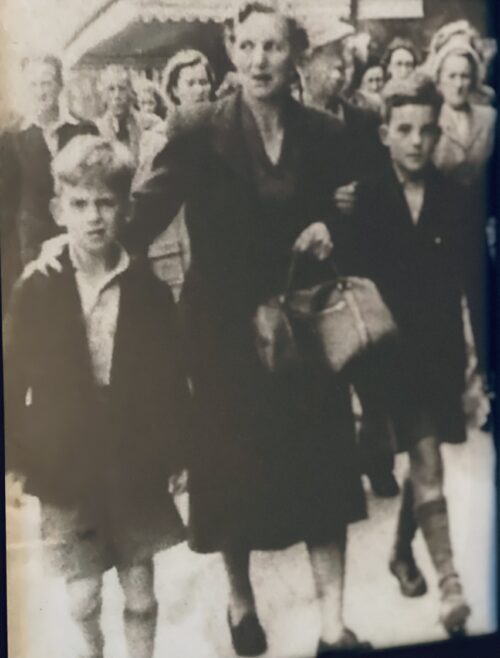
 30cm x 25cm The greatest band in the world came from Liverpool, a city with an Irish population so large that it’s known as “The Real Capital of Ireland”, but although The Beatles’ success is familiar to all, their Irish roots are not so well-known. “We’re all Irish” John Lennon declared when the band toured Ireland in 1963. The singer was born in war-time Liverpool on October 9, 1940 to Julia and Alfred Lennon. His father, a merchant seaman of Irish descent, was away at the time of John’s birth and for much of his life.John knew little about his connection to Ireland whilst growing up, but it was in the post-Beatles days that he became one of the most famous voices calling for a United Ireland and for an end to English presence in Northern Ireland.Known for their political activism, John and Yoko penned two protest songs “Sunday Bloody Sunday” and “The Luck of the Irish” inspired by the events in Northern Ireland for their 1972 album Some Time in New York City Such was the connection Lennon felt to his homeland that he had hoped to make a piece of it a place for him and Yoko Ono to retire. He purchased an island off the West Coast of Ireland, which he owned until his untimely death in 1980.
30cm x 25cm The greatest band in the world came from Liverpool, a city with an Irish population so large that it’s known as “The Real Capital of Ireland”, but although The Beatles’ success is familiar to all, their Irish roots are not so well-known. “We’re all Irish” John Lennon declared when the band toured Ireland in 1963. The singer was born in war-time Liverpool on October 9, 1940 to Julia and Alfred Lennon. His father, a merchant seaman of Irish descent, was away at the time of John’s birth and for much of his life.John knew little about his connection to Ireland whilst growing up, but it was in the post-Beatles days that he became one of the most famous voices calling for a United Ireland and for an end to English presence in Northern Ireland.Known for their political activism, John and Yoko penned two protest songs “Sunday Bloody Sunday” and “The Luck of the Irish” inspired by the events in Northern Ireland for their 1972 album Some Time in New York City Such was the connection Lennon felt to his homeland that he had hoped to make a piece of it a place for him and Yoko Ono to retire. He purchased an island off the West Coast of Ireland, which he owned until his untimely death in 1980.“I'm a quarter Irish or half Irish or something, and long, long before the trouble started, I told Yoko that's where we're going to retire, and I took her to Ireland. We went around Ireland a bit and we stayed in Ireland and we had a sort of second honeymoon there. So, I was completely involved in Ireland” – John Lennon, 1971.
James Paul McCartney was born on June 18, 1942 in Liverpool to Jim and Mary Patricia (Mahon) McCartney, and like many other Liverpool families descended from Irish immigrants. His mother’s father was born in Ireland, and was Roman Catholic, while his great-grandfather was an Irish native, and Protestant.It is unknown which part of Ireland Paul McCartney’s paternal side is from, but it is known that they first emigrated from Ireland to Galloway, Scotland, and then on to Liverpool. McCartney, who immortalised the Mull of Kintyre with his song of the same name also wrote about his Irish heritage in his music. Like John and Yoko, Paul and his first wife Linda wrote in response to the events of Bloody Sunday, drawing from his Irish background in their controversial song “Give Ireland Back to the Irish”. The song was completely banned in Britain but reached number one on the singles chart in Ireland.Then there’s Ringo, and while Ringo Starr is often described as the most English Beatle, Mark Lewisohn in his book Tune In describes one family line going back to County Mayo suggesting that all four of The Beatles can be accurately described as having ancestral roots in Ireland.It was however George Harrison who had the strongest Irish connections, coming from an Irish Catholic family on his mother’s side. Unusually for the time his grandparents never married and Mark Lewisohn suggests that the secretive aspect to his family life and their suspicion of “nosy neighbours” had a lasting effect on the attitude of ‘the quiet Beatle’. Harrison would return to Ireland throughout his life to visit family living in North Dublin, often catching the ferry across from Liverpool to Dublin. He also took his soon-to-be-wife Pattie Boyd on an early vacation to Ireland. Harrison’s music however didn't overtly draw from his Irish heritage, but the films produced through his own company are peppered with references to Ireland.The “Scouse” accent of Liverpool itself betrays Irish influence, the port city became a melting pot of several languages and dialects, as sailors, traders and migrants from other parts of Britain, Ireland and northern Europe established themselves in the area throughout the 19th century. The Irish have played a major role in Liverpool's population and social fabric for a good part of its 800 year history and it is apparent today when visiting the city. It’s safe to say that the people of Liverpool are extremely proud of its four sons and the way that Irish influence has helped to shape this famous musical city. -
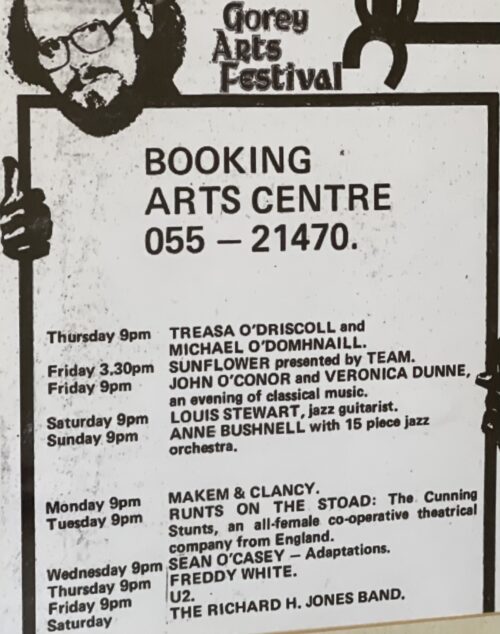
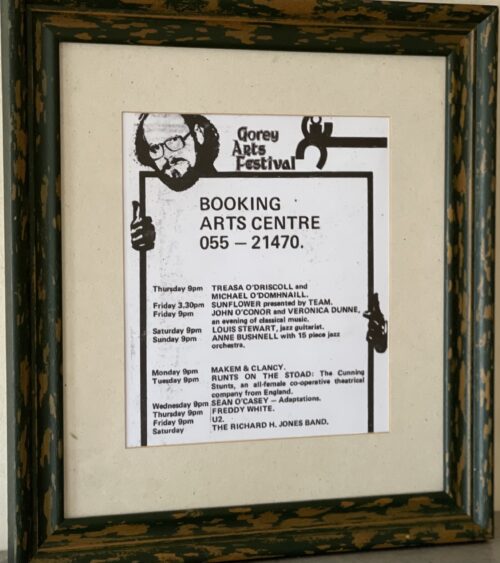 34cm x 37cm 21 years ago an up-and-coming young Irish band strangely named after a German war plane came to play in Gorey. They were called U2. Friday, August 15, 1980, was the day that the young Bono, Edge, Adam and Larry travelled down from Dublin in a van to play on the closing night of the 11th annual Funge Arts Festival, whose posters billed them as 'Ireland's newest rock sensation' - little did they realise how accurate that would turn out to be! Admission to the Theatre Hall for U2 was £2.50, which represented one of the highest prices for any event at that year's Festival. Only the performance by Freddie White in the Funge Arts Centre on the same night cost more, £3. Interest in the gig was high amongst rock music fans throughout county Wexford and south county Wicklow, as the potential shown by the young U2 had already been spotted by the rock and roll press. Bono and the boys had already released four singles - 'U23', 'Another Day', '11 o'clock Tick Tock' and 'A Day Without Me' by the time they came to Gorey, and belted them all out from the Theatre Hall stage, while the set list that night also included a number of other tracks from their first album, 'Boy', which would hit the record shops just two months later. By all accounts, the venue was packed out with music fans.
34cm x 37cm 21 years ago an up-and-coming young Irish band strangely named after a German war plane came to play in Gorey. They were called U2. Friday, August 15, 1980, was the day that the young Bono, Edge, Adam and Larry travelled down from Dublin in a van to play on the closing night of the 11th annual Funge Arts Festival, whose posters billed them as 'Ireland's newest rock sensation' - little did they realise how accurate that would turn out to be! Admission to the Theatre Hall for U2 was £2.50, which represented one of the highest prices for any event at that year's Festival. Only the performance by Freddie White in the Funge Arts Centre on the same night cost more, £3. Interest in the gig was high amongst rock music fans throughout county Wexford and south county Wicklow, as the potential shown by the young U2 had already been spotted by the rock and roll press. Bono and the boys had already released four singles - 'U23', 'Another Day', '11 o'clock Tick Tock' and 'A Day Without Me' by the time they came to Gorey, and belted them all out from the Theatre Hall stage, while the set list that night also included a number of other tracks from their first album, 'Boy', which would hit the record shops just two months later. By all accounts, the venue was packed out with music fans.

